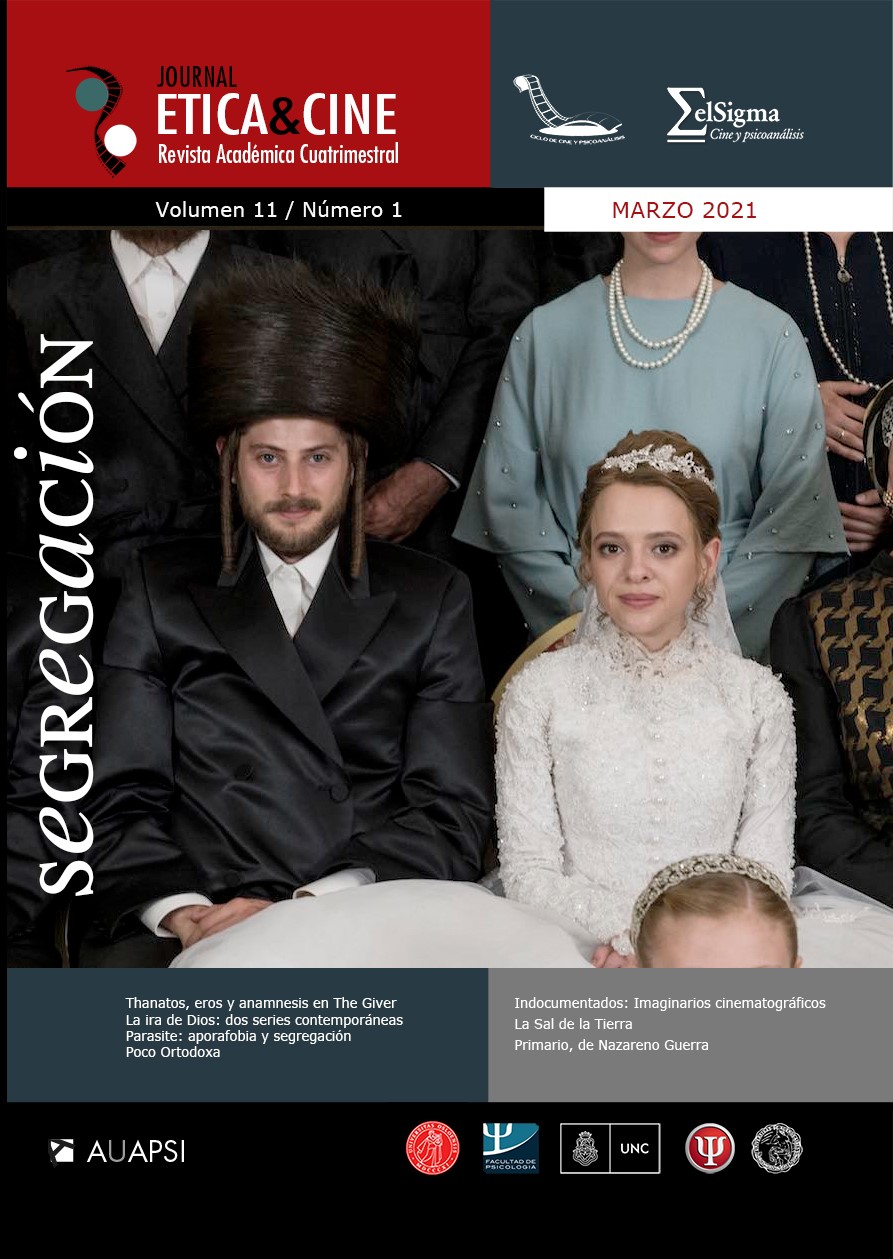To believe in the other. Thanatos, eros and anamnesis in The Giver
DOI:
https://doi.org/10.31056/2250.5415.v11.n1.32568Keywords:
Equality, Difference, Other, Anguish, MemoryAbstract
Based on the novel and the film The Giver, this papers shows the paradox and contradictions born out of the attempt of an egalitarian and pacifist position – the classical answer to those discriminations that originate suffering and violence – to eliminate everything that is a source of distinction and therefore of anguish. In the second place, we argue that in the name of an equality achieved by means of eliminating the violence born out of difference, a worse violence is originated. And that the social elimination of death and desire, as signals of that memory and fundamental events of human experience, did not contribute to heal that division but instead it set a damage beyond limits. The argument shows that a production of neutral human beings, without past guilt nor future anguish, withouth meaningful individual differences, does not bring about a life that is more free, fraternal and egalitarian, but an intrinsic and boundless sort of violence. Finally we will explore the memory of differenciation and of the law as role of the other and as starting point for a more complete subjective appropriation.
Downloads
References
Adorno, Th.W. (2005). Dialéctica negativa; La jerga de la autenticidad. Akal.
Certeau, M. de (1993). La fábula mística. Ediciones Universidad Iberoamericana.
Derrida, J. (2003a). Voyous. Galilée.
Derrida, J. (2003b). El siglo y el perdón. Fe y saber. Ediciones de la Flor.
Habermas, J. (1993). El discurso filosófico de la modernidad. Taurus.
Habermas, J. (2001). Israel o Atenas. Trotta.
Heidegger, M. (1990). Identidad y diferencia. Anthropos.
Heidegger, M. (1997). Ser y tiempo. Editorial Universitaria.
Koenigsberg, N., Silver, N. (productores) y Noyce, P. (director). (2014). The Giver [cinta cinematográfica]. Walden Media y The Weinstein Company.
Levinas, E. (1987). De otro modo que ser o más allá de la esencia. Sígueme.
Levinas, E. (1995). Totalidad e infinito. Sígueme.
Levinas, E. (2009). Parole et silence. Oeuvres 2. Grasset.
Lowry, L. (1993) The Giver. Houghton Mifflin.
Mendiola, A. (2014). Michel de Certeau: epistemología, erótica y duelo. Ediciones Navarra.
Metz, J.B. (2007). Memoria passionis. Una evocación provocadora en una sociedad pluralista. Sal Terrae.
Miller, J.A. (2005). La utilidad directa. Freudiana (43-44), pp. 7-30.
Moltmann, J. (1975). El Dios crucificado. Sígueme.
Nietzsche, F. (1995)[1882]. La gaya ciencia. ME Editores.
Rosenzweig, F. (1997). La Estrella de la Redención. Sígueme.
Thurian, M. (1965). La eucaristía. Sígueme.
Yerushalmi, Y. (1982). Zakhor. Jewish History and Jewish Memory. University of Washington Press.
Žižek, S. (2005). El títere y el enano. El núcleo perverso del cristianismo. Paidós.
Žižek, S. (2009a). Sobre la violencia. Seis reflexiones marginales. Paidós.
Žižek, S. (2009b). El frágil absoluto o ¿por qué merece la pena luchar por el legado cristiano? Pre-Textos.
Downloads
Published
How to Cite
Issue
Section
License

This work is licensed under a Creative Commons Attribution-ShareAlike 4.0 International License.
Los autores que publiquen en Ética y Cine Journal aceptan las siguientes condiciones:
Los autores/as conservan los derechos de autor © y permiten la publicación a Ética y Cine Journal, bajo licencia CC BY-SA / Reconocimiento - Reconocimiento-CompartirIgual 4.0 Internacional. La adopción de esta licencia permite copiar, redistribuir, comunicar públicamente la obra, reconociendo los créditos de la misma, y construir sobre el material publicado, debiendo otorgar el crédito apropiado a través de un enlace a la licencia e indicando si se realizaron cambios.

Este obra está bajo una licencia de Creative Commons Reconocimiento-CompartirIgual 4.0 Internacional.




